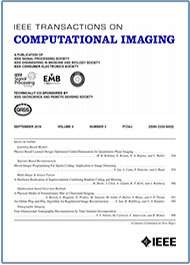- Our Story
- Publications & Resources
- Publications & Resources
- Publications
- IEEE Signal Processing Magazine
- IEEE Journal of Selected Topics in Signal Processing
- IEEE Signal Processing Letters
- IEEE Transactions on Computational Imaging
- IEEE Transactions on Image Processing
- IEEE Transactions on Information Forensics and Security
- IEEE Transactions on Multimedia
- IEEE Transactions on Signal and Information Processing over Networks
- IEEE Transactions on Signal Processing
- IEEE TCI
- IEEE TSIPN
- Data & Challenges
- Submit Manuscript
- Guidelines
- Information for Authors
- Special Issue Deadlines
- Overview Articles
- Top Accessed Articles
- SPS Newsletter
- SigPort
- SPS Resource Center
- Publications FAQ
- Blog
- News
- Dataset Papers
- Conferences & Events
- Community & Involvement
- Professional Development
- For Volunteers
- Information for Authors-OJSP
-
Home
Conferences Events IEEE Signal Processing Magazine IEEE SPL Article IEEE TIFS Article IEEE TMM Article IEEE TSP Article Jobs in Signal Processing Lectures Machine Learning Seasonal Schools Signal Processing News SPM Article SPS Distinguished Lectures SPS Newsletter Article SPS Webinar SPS Webinars SPS Webinar Series Webinar webinars
-
Our Story
What is Signal Processing?

The technology we use, and even rely on, in our everyday lives –computers, radios, video, cell phones – is enabled by signal processing. Learn More » -
Publications & Resources
-
SPS Resources
- Signal Processing Magazine The premier publication of the society.
- SPS Newsletter Monthly updates in Signal Processing
- SPS Resource Center Online library of tutorials, lectures, and presentations.
- SigPort Online repository for reports, papers, and more.
- SPS Feed The latest news, events, and more from the world of Signal Processing.
-
SPS Resources
-
Conferences & Events
-
Community & Involvement
-
Membership
- Join SPS The IEEE Signal Processing Magazine, Conference, Discounts, Awards, Collaborations, and more!
- Chapter Locator Find your local chapter and connect with fellow industry professionals, academics and students
- Women in Signal Processing Networking and engagement opportunities for women across signal processing disciplines
- Students Scholarships, conference discounts, travel grants, SP Cup, VIP Cup, 5-MICC
- Young Professionals Career development opportunities, networking
- Get Involved
-
Technical Committees
- Applied Signal Processing Systems
- Audio and Acoustic Signal Processing
- Bio Imaging and Signal Processing
- Computational Imaging
- Image Video and Multidimensional Signal Processing
- Information Forensics and Security
- Machine Learning for Signal Processing
- Multimedia Signal Processing
- Sensor Array and Multichannel
- Signal Processing for Communication and Networking
- Signal Processing Theory and Methods
- Speech and Language Processing
- Technical Working Groups
- More TC Resources
-
Membership
-
Professional Development
-
Professional Development
- Signal Processing Mentorship Academy (SigMA) Program
- Micro Mentoring Experience Program (MiME)
- Distinguished Lecturer Program
- Distinguished Lecturers
- Distinguished Lecturer Nominations
- Past Lecturers
- Distinguished Industry Speaker Program
- Distinguished Industry Speakers
- Distinguished Industry Speaker Nominations
- Industry Resources
- IEEE Training Materials
- Jobs in Signal Processing: IEEE Job Site
-
Career Resources
- SPS Education Program Educational content in signal processing and related fields.
- Distinguished Lecturer Program Chapters have access to educators and authors in the fields of Signal Processing
- Job Opportunities Signal Processing and Technical Committee specific job opportunities
- Job Submission Form Employers may submit opportunities in the area of Signal Processing.
-
Professional Development
-
For Volunteers
-
For Board & Committee Members
- Board Agenda/Minutes* Agendas, minutes and supporting documentation for Board and Committee Members
- SPS Directory* Directory of volunteers, society and division directory for Board and Committee Members.
- Membership Development Reports* Insight into the Society’s month-over-month and year-over-year growths and declines for Board and Committee Members
-
For Board & Committee Members
Popular Pages
Today's:
- Information for Authors
- 2030 IEEE International Conferences on Acoustics, Speech, and Signal Processing (ICASSP 2030)
- Access Restricted
- (ICME 2026) 2026 IEEE International Conference on Multimedia and Expo
- IEEE Transactions on Information Forensics and Security
- Signal Processing Cup
- Jobs in Signal Processing
- IEEE Transactions on Image Processing
- Submit a Manuscript
- Meet SPS Member Arvind Rao
- IEEE Transactions on Audio, Speech and Language Processing
- Membership
- IEEE Transactions on Multimedia
- IEEE Signal Processing Letters
- (ASRU 2025) 2025 IEEE Automatic Speech Recognition and Understanding Workshop
All time:
- Information for Authors
- Submit a Manuscript
- IEEE Transactions on Image Processing
- IEEE Transactions on Information Forensics and Security
- IEEE Transactions on Multimedia
- IEEE Transactions on Audio, Speech and Language Processing
- IEEE Signal Processing Letters
- IEEE Transactions on Signal Processing
- Conferences & Events
- IEEE Journal of Selected Topics in Signal Processing
- Information for Authors-SPL
- Conference Call for Papers
- Signal Processing 101
- IEEE Signal Processing Magazine
- Guidelines
Last viewed:
- Signal Processing 101
- Jobs in Signal Processing
- Steered Mixture-of-Experts for Light Field Images and Video: Representation and Coding
- Login
- Guidelines for Associate Editors
- Access Restricted
- Editorial Board Nominations
- Call for proposals: 2027 IEEE Conference on Artificial Intelligence (CAI)
- IEEE Transactions on Audio, Speech and Language Processing
- Board of Governors
- Dataset Papers
- Meet SPS Member Arvind Rao
- (ICASSP 2023) 2023 IEEE International Conference on Acoustics, Speech and Signal Processing
- (ICASSP 2026) 2026 IEEE International Conference on Acoustics, Speech, and Signal Processing
- Digital Edition-Content Gazette
Reconstructing Clear Image for High-Speed Motion Scene With a Retina-Inspired Spike Camera
You are here
Publications & Resources
Transactions on Computational Imaging
For Authors
Top Reasons to Join SPS Today!
1. IEEE Signal Processing Magazine
2. Signal Processing Digital Library*
3. Inside Signal Processing Newsletter
4. SPS Resource Center
5. Career advancement & recognition
6. Discounts on conferences and publications
7. Professional networking
8. Communities for students, young professionals, and women
9. Volunteer opportunities
10. Coming soon! PDH/CEU credits
Click here to learn more.
Reconstructing Clear Image for High-Speed Motion Scene With a Retina-Inspired Spike Camera
Conventional digital cameras typically accumulate all the photons within an exposure period to form a snapshot image. It requires the scene to be quite still during the imaging time, otherwise it would result in blurry image for the moving objects. Recently, a retina-inspired spike camera has been proposed and shown great potential for recording high-speed motion scenes. Instead of capturing the visual scene by a single snapshot, the spike camera records the dynamic light intensity variation continuously. Each pixel on spike camera sensor accumulates the incoming photons independently and persistently, which fires a spike and restarts the photon accumulation immediately once the dispatch threshold is reached, producing a continuous stream of spikes recorded at very high temporal resolution. To recover the dynamic scene from captured spike stream, this paper presents an image reconstruction approach for spike camera. In order to generate high-quality reconstruction, we investigate the temporal correlation along motion trajectories and exploit it via adaptive temporal filtering. In particular, we present a hierarchical motion-aligned temporal filtering scheme, combining short-term filtering with long-term filtering to take advantage of long-term temporal correlation with low model complexity. Experimental results demonstrate that the proposed scheme outperforms the existing schemes significantly, producing much better objective and subjective qualities for spike camera image reconstruction.
SPS Social Media
- IEEE SPS Facebook Page https://www.facebook.com/ieeeSPS
- IEEE SPS X Page https://x.com/IEEEsps
- IEEE SPS Instagram Page https://www.instagram.com/ieeesps/?hl=en
- IEEE SPS LinkedIn Page https://www.linkedin.com/company/ieeesps/
- IEEE SPS YouTube Channel https://www.youtube.com/ieeeSPS
Home | Sitemap | Contact | Accessibility | Nondiscrimination Policy | IEEE Ethics Reporting | IEEE Privacy Policy | Terms | Feedback
© Copyright 2025 IEEE - All rights reserved. Use of this website signifies your agreement to the IEEE Terms and Conditions.
A public charity, IEEE is the world's largest technical professional organization dedicated to advancing technology for the benefit of humanity.











